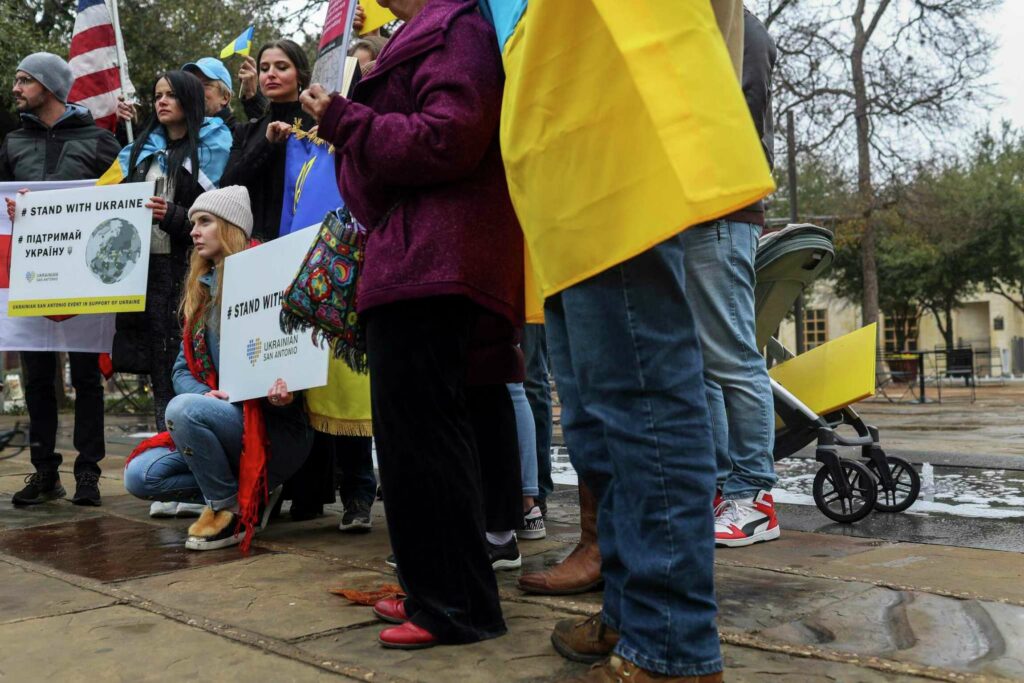
Anastasia Sydoruk called her father in Lutsk in northwest Ukraine on Thursday to say goodbye, perhaps, she fears, for the final time. As the Russian army invaded from the east, Igor Sydoruk was called up to the army reserves to join the fight.
“I’m terrified,” said Anastasia, 26, her voice quavering. “I’m hearing that I most likely will never see him again.”
Sydoruk is one of an estimated 3,000 people of Ukrainian descent living in the San Antonio area, most watching with dread the reports of fierce fighting across the eastern European country. Many, like the stay-at-home mother who immigrated to the United States seven years ago, still have family there.
“It’s terrifying to think about,” she said.

On a wet and chilly day, about two dozen protesters, many born in Ukraine, gathered in Main Plaza to protest what President Joe Biden called Russia’s “brutal assault” on the country, which has been independent since shortly after the Soviet Union collapsed in 1991.
Many at the protest, such as Olenka Bravo, said they are concerned about relatives and friends living in the country. Bravo’s parents are divorced, but both live in Kyiv.

“I spoke to my mother and she said she can hear the noise from the bombing,” said Bravo, 35, who has lived in the U.S. for 14 years. “My dad isn’t in good health and he’s trying to get out of the city and get to the west of the country, where they say it’s safer.”
Oleana Khrystyuk said she spoke with a cousin who has a newborn, but she said there’s been a run on food, leaving store shelves empty. Another friend has a child with a fever but can’t get any medicine because all the pharmacies are closed.
“I mean, what does this mean? When will it end?” said Khrystyuk, who was born in Vinnytsia and has lived in the U.S. more than 25 years.
There was a common belief in the crowd that Russian President Vladimir Putin, a former KGB agent who has often expressed the desire to rebuild the Soviet Union, would not be satisfied with annexing Ukraine.
“This is not the first country Putin has attacked,” said Julia Walters, alluding to Russia’s seizure of Crimea from Ukraine in 2014. She was born in the Zhytomyr region of Ukraine and has lived in the U.S. since 2004. “And if he wins, it’s not going to be the last one.”
Walters and others expressed concern that if Putin’s depredations in Ukraine are not met with a strong response by the rest of the world, it will embolden other bad actors.
“Don’t think that China isn’t watching what’s going on in Ukraine,” Khrystyuk said.
Putin’s actions appear to have turned away at least some who previously supported him. Victor, a banker who asked that his last name not be published, said he was a high school student in Luhansk, near the Russian border, when Ukraine gained its independence.
“I grew up speaking Russian in a pro-Russia area,” he said. “And I remember not liking that Ukraine was becoming independent of Russia.”
But now, he explained, Ukraine has been an independent country for more than 30 years, and the situation has changed.
“I think I see a very evil plan being played out by Putin,” he said. “When you’re dealing with evil, you have to realize that evil is not going to stop by itself.”
There was little confidence that the West’s efforts to discourage Putin via diplomacy and threats of sanctions would have much effect.
“Why would it?” said Irene Van Winkle, who was born to Ukrainian parents and has lived in the U.S. since 1973. “Putin’s not afraid of sanctions. He’s got billions of dollars in the bank. What does he care?”
Bravo said she’d like to see the U.S. increase oil and gas production so the European Union wouldn’t be so dependent on Russia.
“That’s my message to the Texas government: increase drilling,” she said.
None of the protesters said they were surprised that Putin had launched the invasion, even after weeks of feints and hints that he was withdrawing troops from the border area.
“For the past few months, my mom’s been telling me everyone’s concerned, what will happen, what will happen,” Khrystyuk said. “We were all hoping for a diplomatic solution, but everyone there was also stocking up on food just in case.”
Whatever happens, Sydoruk holds out little hope that Putin will be dissuaded by his own people. She said she thinks state-controlled media in Russia are keeping much of the country in the dark.
“I called a cousin who lives in Russia and asked what he thought about what was happening,” she said. “He said, ‘Are you crazy? What war?’




